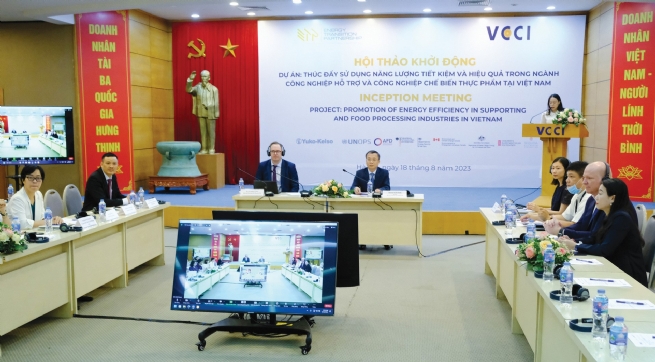Expected goals
On July 25, 2022, the Prime Minister ratified Decision 888/QD-TTg, which outlines tasks and solutions for the implementation of commitments to the 26th Conference of the Parties to the United Nations Framework Convention on Climate Change (COP26). The project aims to enable Vietnam to join global low-carbon development trends, mobilize resources, innovate technology to transform growth models, restructure the economy, and contribute to the Vietnamese government’s efforts in response to global climate change. It also aims to facilitate energy transition to fulfill Net Zero emission commitments by 2050.
Speaking at the recent Inception Meeting on “Promotion of energy efficiency in supporting and food processing industries in Vietnam,” Mr. Bui Trung Nghia, Vice President of the Vietnam Chamber of Commerce and Industry (VCCI), emphasized that promoting energy efficiency solutions in business is vital for socioeconomic development and important for ensuring national energy security.
Companies are encouraged to adopt energy-efficient practices by providing technical support to apply modern technology and production automation. Employees are also encouraged to change habits and raise awareness of energy efficiency. High-efficiency power devices can consume 20-40% less electricity, depending on the scale and technology in use.
Mr. John Robert Cotton, Senior Program Manager of the Southeast Asia Energy Transition Partnership (ETP), remarked on energy use in Vietnam’s industries. He noted that the food processing and supporting industries are experiencing rapid industrialization, with significant potential to reduce energy consumption and greenhouse gas emissions. However, many of these companies face challenges in adopting energy-saving measures due to limited access to information on energy efficiency, sustainability, and green production practices. Financial and technical constraints often lead manufacturers to overlook energy-efficient and cost-effective solutions, including the capacity to assess energy consumption and develop projects to secure appropriate financing sources.
The “Promotion of Energy Efficiency in Supporting and Food Processing Industries in Vietnam” project has been launched in the north and south regions of Vietnam, where many businesses with high expected goals are concentrated.
The project aims to raise awareness and improve management methods for the economical and efficient use of energy by 100 manufacturers in supporting and food processing industries. About 10 factories will be supported to develop viable energy efficiency projects, while three other factories will apply technology to improve energy efficiency.
The project is expected to establish a network for the economical and efficient use of energy, including manufacturers, energy services companies (ESCOs), financial institutions, and stakeholders. It will also consult the roadmap to establish the ESCO Association and pilot a benchmarking tool for the economical and efficient use of energy.
Joint efforts
Ms. Nguyen Thi Thanh Huyen, Project Coordinator, Project Management Board, VCCI, stated that the project’s biggest output is assisting the National Energy Conservation Program in 2019-2030 and launching the Energy Service Company (ESCO) business model in Vietnam. She added that the project aims to jointly build an energy-efficient business community to link with other donors and projects. Upon completion, the project will impact and attract more partners to participate on a larger scale. However, this requires the effort of businesses and the cooperation of the government and financial institutions.
Mr. Tran Ha Ninh, representative of the Department of Climate Change under the Ministry of Natural Resources and Environment, said that energy efficiency solutions include improving solutions for the efficient use of energy and promoting the transition to clean energy. Other solutions include increasing the penetration rate of energy-saving and high-efficiency devices and using hydrogen in place of coal, electrifying agriculture and energy-efficient equipment in the post-harvest agricultural production chain, developing heat-resistant buildings, using green, nature-friendly cooling solutions, and using low-emission building materials and recycled materials.
In addition to applying mandatory standards and regulations along with sanctions on the efficient use of electricity for power-intensive fields and industries, fostering the Energy Service Company (ESCO) business model is also a positive solution for businesses.
Ms. Nguyen Thi Thanh An, Director of Energy Transformation at the French Development Agency in Vietnam (AFD), stated that AFD wishes to expand funding for green projects through Vietnamese commercial banks. AFD grants green credit lines to banks, and the latter provides credit for companies. AFD is willing to provide banks with guarantees to participate in risk sharing.
“AFD is developing a building energy conservation program where Vietnam and Cambodia are the main beneficiaries. However, as key actors, businesses and consultants need to join efforts to launch good projects,” she emphasized.
By Thu Ha, Vietnam Business Forum








